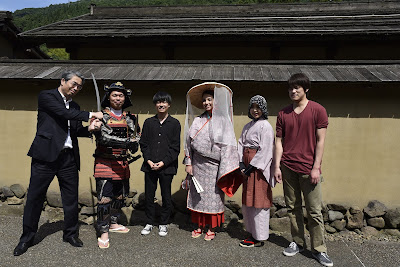As I have introduced in our previous blog that I visited Ichijodani Asakura Clan Ruins in June 2017 with the president of the Hotel Riverge Akebono, Mr. Shimizu, the intern of the hotel, Ms. Julia Coslian, the manager of Fukui City Hospitality and Tourism Promotion Office, Mr. Takama and his staff member, Mr. Juancho Santamaria.
There are some staff members wearing Kimono standing in front of the restored warrior’s residences, temples, merchant’s houses, craftsman’s houses. If you ask them any questions they’d answer nicely and politely.
Usually, the staff members do not walk with visitors, they stay in front of the places in Ichijodani Asakura Clan Ruins but one of the staff members gave us a special guidance. She showed us around and explained about the history and the things were exhibited. She was very kind and nice from the beginning to the end.
Inside of the restored houses, you can see how people used to live from 1471 to 1573 in the area.
174 Shogi pieces were found outside of the castle in 1973. It was discovered that they were from 1558 to 1570.
During the Warring States Period, people were focusing on making lightweight and high performance armor but Asakura clan made people make the heavy and luxurious ones.
In side of these restored warrior’s residences, temples, merchant’s houses, craftsman’s houses, you can see how things used to be and how people used to live closely. It is enjoyable to see these things imagining how everything used to be. When you have a chance, how about visiting Ichijodani Asakura Clan Ruins.
I’d like to share a video which has been provided by Fukui Prefecture, "Letter of the Fortune: Fukui, home for happiness to come". Ai Takahashi, an actress born in Fukui introduces various places and things including Ichijodani Asakura Clan Ruins. Please enjoy!
T.F
Please enjoy our previous blogs.
Spreading the Charms of Fukui to the World! -Visiting Ichijodani Asakura Clan Ruins Part 1-
Spreading the Charms of Fukui to the World! -Visiting Ichijodani Asakura Clan Ruins Part 2-
Spreading the Charms of Fukui to the World! -Visiting Ichijodani Asakura Clan Ruins Part 3-
Spreading the Charms of Fukui to the World! -Visiting Ichijodani Asakura Clan Ruins Part 4-
Spreading the Charms of Fukui to the World! -Visiting Ichijodani Asakura Clan Ruins Part 5-
You can see some tourist attractions and the directions to these places from the webpage, "Hotel Reiverge Akebono, Tourist attractions around our hotel".
Made by Julia during her internship, this webpage has directions that are easy to follow.
She researched these tourist attractions, before visiting them and experiencing
the charms of Fukui herself. As I mentioned in our blog, it can be difficult for tourists
to get to some great places in Fukui, so this map that Julia made will help you
get around easier.
There is also a Japanese version of this webpage(only available in Japanese).
However, some of the places which are introduced on the Japanese webpage
are different to the English version that Julia made.


































